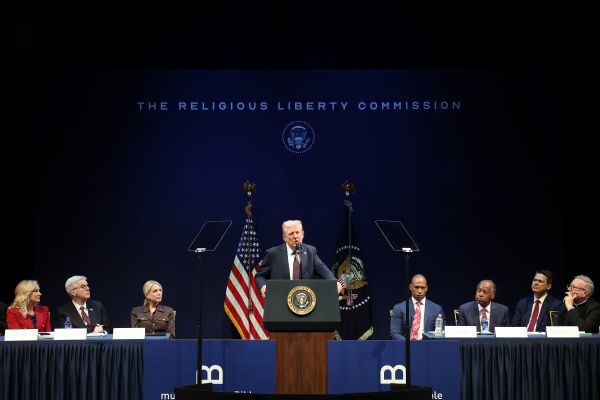One verse to eliminate reparations as a biblically just option

The discussion about reparations has grown increasingly divisive as both proponents and opponents of reparations make their case. Political hopefuls campaign on the idea that if elected they will see to it that reparations are paid. Newly elected politicians seeking to make a name for themselves sound a rally cry for reparations.
I’ve been writing often about the subject, my last article can be found here. What I’ve been most surprised about is the Christians who genuinely believe this is the right thing to do. Granted, it’s not a majority, far from it in fact. It’s a small number of Christians (of all racial backgrounds) that genuinely believe paying reparations to descendants of slaves would be proper, biblically.
Unfortunately, many of these well-meaning believers have not thought deeply about the topic (as evidenced by the comments on some of my previous articles). For example, how would the federal government, if they imposed reparations, prove that every individual black person is in fact the descendent of a slave? It is reasonable to believe that not every black person in America is descended from a slave, so what will the criteria be? Also, are we only going to pay reparations to black people (that seems to generally be the attitude in this discussion)? What about the Native Americans forced into “reservations” after having their land and wealth stripped by the American government? Do they get reparations?
The list of questions can go on and on:
- Do blacks that owned slaves get reparations, or do they have to pay reparations?
- Do whites enslaved by blacks get reparations?
You get the point. The nuance of the issue is more than complex, and few answers have been offered by anyone. But more important is the biblical aspect to this discussion. While I’ve seen Christians take Zacchaeus out of context to twist the meaning into a justification for reparations, I’ve not seen a solid theological case supporting reparations made up to this point. Mostly what I’ve seen is a confusion between reparations and restitution when using Scripture.
I have, however, seen a solid theological case made for why reparations are not biblically just, using two simple verses:
Yet you say, ‘Why should not the son suffer for the iniquity of the father?’ When the son has done what is just and right, and has been careful to observe all my statutes, he shall surely live. The soul who sins shall die. The son shall not suffer for the iniquity of the father, nor the father suffer for the iniquity of the son. The righteousness of the righteous shall be upon himself, and the wickedness of the wicked shall be upon himself.”
Ezekiel 18:19-20
(See also Jer. 31:29-30)
In these verses we have God making it clear that future generations are not to be held accountable for the sins of past generations. The biblical principles of restitution are clear and strong; but they only apply to the person that actually did the wrong (as in the case of Zacchaeus). To seek restitution (or reparations) from people that did not commit a crime or defraud another person is to apply guilt to an innocent person. But these verses in Ezekiel make it clear that applying guilt to the innocent is a violation of biblical justice.
But, and this is important, the modern push for reparations completely misses the foundation of the Gospel: forgiveness. Modern reparations make financial restitution of an entire class of people the basis for their “true” repentance and obtaining the Gospel. In other words, “if white people want to really prove they are saved, they will pay reparations.” This is an entirely false position that perverts the clear message of the Gospel: salvation is by grace alone, through faith alone, in Christ alone, without any works.
One distinction we have to make is the difference between what God does and what human government does. If God chooses to punish people generations later, He may do so, He is God. But that is a far cry different from a human government imposing reparations. God may do as He determines in the perfection of His will. But human governments are still bound to laws of justice. And, as made clear in Ezekiel, imposing guilt and punishment on the innocent is biblically unjust.
Finally, we have to ask: where does it end? Many of the doctrines espousing reparations see no end to the “white guilt” that needs to be atoned for. But haven’t all sins been atoned for by the blood of Christ? As one forgiven of all my sins, am I not commanded to forgive others for their sins? (Matthew 6:9-14) The doctrine of reparations advocated in our culture lacks the finality of atonement as found in biblical forgiveness. This is another reason Christians should reject any such doctrine.
I am thoroughly unconvinced that a theologically faithful argument for reparations exists. At this point the issue seems better used as a political weapon to divide. And some may be using it to maintain a base of voters that have veered too close to the other political side in recent years. Even high-ranking members of Congress have called imposing reparations a logistical nightmare; largely because of determining who would be eligible and who would not. And yet the issue continues to rear up during election cycles. One has to wonder if it's more a siren song than anything else.
For Christians, our sins, past, present, and future, have been atoned for and forgiven. We are now instructed to forgive the sins of others just as Christ forgave our sins (Matt. 18:21-35). Attaching a financial act to forgiveness distorts the biblical picture Christ gave and replaces it with a disfigured image unrecognizable to the biblical principle. We will do better to faithfully forgive others as instructed and release the hate and bitterness in our hearts, than to get silver and gold from the federal government.
Nathan Cherry is a financial advisor specializing in personal financial management and debt reduction. After more than a decade in church ministry, Nathan found a place for his talents in money management in the financial services industry working for a respected financial planning firm. Nathan also writes on social and moral issues at www.nathancherry.com.





















